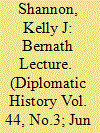| Srl | Item |
| 1 |
ID:
172590


|
|
|
|
|
| Summary/Abstract |
To borrow a concept from Community, one of my favorite TV shows, it often feels as though we’re currently on the “darkest timeline.” So I thought I’d start my Bernath Lecture with something lighthearted … like a murder. In April 1921, a woman in Washington, D.C. shot and killed her husband. Then, as now, it was much less common for a wife to murder her husband than the reverse. What makes this case particularly noteworthy to me was the fact that the wife, early twenty-something Lydia Gertrude Kanode Molavi, was American, and her twenty-six year-old husband, Abdul Hussein Molavi, was Iranian.
|
|
|
|
|
|
|
|
|
|
|
|
|
|
|
|
| 2 |
ID:
134277


|
|
|
|
|
| Summary/Abstract |
On 6 November 1990, nearly 50 Saudi women staged a protest against the ban on women operating motor vehicles in Saudi Arabia. Occurring in the midst of the First Gulf War, the women's protest was a political statement about the harsh restrictions placed on women in the Middle Eastern country which both reflected and influenced Saudi society’s encounter with their American allies during the war. When United States (US) military personnel flooded into Saudi Arabia during the war, they were shocked at the way American servicewomen were treated by their Saudi allies and the second-class status of Saudi women throughout the country. This article explores Americans' reactions to their encounter with Saudi gender relations during the war and argues that the poor treatment of women in Saudi Arabia—which Americans dubbed ‘gender apartheid’—caused many Americans to question the longstanding US alliance with the conservative Muslim country. In doing so, US journalists, military personnel, scholars and the general public began to demand that concern about women's rights should be integrated seriously into US foreign policy towards the Muslim world.
|
|
|
|
|
|
|
|
|
|
|
|
|
|
|
|